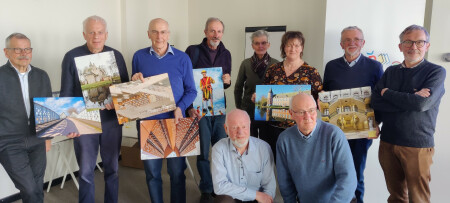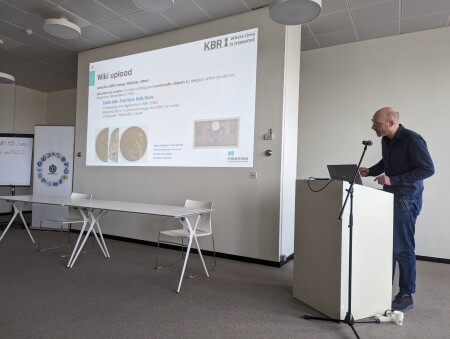Public Domain Day 2023
- Record
Public domain collections can be accessed online, making them the ideal place to get started with your open data policy. Every year since 2018, Public Domain Day has been offering the heritage sector a platform to share their achievements, challenges and visions for providing access to collections that are no longer protected by copyright. This year on 15 February, we organised an event together with the Royal Library of Belgium (KBR), Wikimedia Belgium and Ghent University Library.
We celebrated this 8th edition of Public Domain Day with a well-filled programme and 49 participants – welcoming speakers from Creative Commons, KU Leuven, ODIS, Passchendaele Museum, Flanders Heritage Agency, KBR, COMMUNIA, Collections of Ghent, and of course also meemoo. Wikimedia Belgium also took the opportunity to award its prizes for its Wiki Loves Heritage photo competition.
What and why?
All creative works that are not subject to intellectual property rights (anymore), such as copyrights and other related rights, belong in the public domain. New works become available in the public domain in Belgium every year as copyright protection expires 70 years after the death of the author or artist.
Content in the public domain is therefore perfect for inclusion in your open data policy and making available for re-use. With Public Domain Day, we provide organisations in the heritage sector with a platform to exchange good practices and publicise their public domain plans and achievements worldwide.
Public Domain Day 2023
View the slides from Public Domain Day 2023 here:
Rights workshop: identifying public domain collections
To help organisations identify public domain works in their own collections, we also always organise a rights workshop. This year – thanks to KBR’s hospitality – we held this workshop on the same day as the public domain event. And it was a great success! We’re normally able to help around 15 participants, but this year we welcomed twice as many.
View the slides from the rights workshop here:
Public Domain Day celebration
What was on the programme? Following the rights workshop, we delved even deeper into the practical side of rights and the public domain with two presentations.
Meemoo colleague Bart Magnus showed how you can use the Public Domain Tool to determine the rights status of your collections. This tool uses personal data on Wikidata to determine the rights status.
Joris Colla and Fien Messens (ODIS / KADOC-KU Leuven) illustrated how they published 31,000 people records from their system on Wikidata. This ensures Wikidata expands further as a knowledge hub, and the uploads in turn increase the power of the Public Domain Tool.
Steps towards an open data policy in Belgian heritage institutions
With Public Domain Day, we aim to provide an annual platform for institutions that want to take steps towards an open data policy. Meemoo supports these institutions with putting this policy into practice, for example with an upload to Wikidata and the Wikimedia Commons image database. The 8th edition of Public Domain Day featured the following experiences:
Wouter De Witte (Passchendaele Museum) followed our Wikimedia upload workshop in 2022, and he outlined their plan for opening up collections in 2023;
Koen Van Daele (Flanders Heritage Agency) showed how they unlocked 6,220 architectural drawings on their image database;
Piet Janssens (KBR) provided an overview of the public domain collections that they uploaded this year. They provided access to shellac records with songs from Lodewijk Mortelmans, medals by Adelin Salle, Pirart René and Emile Vloors, and drawings and prints by Constant Permeke, Paul Cauchie, Albert Daenens, Leon Bartholomé, Hippolyte Daeye and Paul Collet.
International perspective
Later in the day, we looked at making public domain works available with a more international perspective:
Douglas McCarthy (Europeana) has been tracking the opening up of public domain collections for the past five years. Their OpenGLAM survey includes 1,481 institutions worldwide, of which 34 are Belgian. You should make sure you’re included if your organisation is also unlocking public domain collections;
Brigitte Vézina (Creative Commons) and Emine Yildirim (KU Leuven) presented the publication Towards better sharing of cultural heritage, which is aimed at the policymakers themselves. After all, from a policy perspective, collection management institutions need support and a mandate to further develop their accessibility activities;
Brigitte Vézina (COMMUNIA) looked ahead to the future of copyright, and how it might be reshaped further, with COMMUNIA’s copyright reform policy recommendations. COMMUNIA wants to use usage rights to align copyright restrictions more closely with reality – where the difference between creators and users is not always clear. One good example of this is a documentary maker who also uses work by other makers.
(Creative) re-use
Then we looked in more detail at re-using public domain works in practice. Simply making public domain works available is not enough. As a sector, we also need to encourage value creation by facilitating (creative) re-use.
Rein Debrulle (Flemish Art Collection), in his role at the Ghent Centre for Digital Humanities, presented A rambling search for public domain maps. He shared his experience of finding high-resolution sources for the Gent Gemapt (‘Ghent mapped’) project, and also made a case for open data and transparent user guidelines;
Saar Vandeweghe and Thijs Temmerman (Collections of Ghent) explained more about their Cultural Data Lab, with which they are stimulating the (creative) re-use of materials from the Collections of Ghent project. Specifically, they did this by awarding grants with their Co-creation Fund, and organising a hackathon and a GIF workshop.
Cherry on top?
We ended the day with the prize-giving for the Wiki Loves Heritage photo competition. Geert Van Pamel (Wikimedia Belgium) also launched a new call for their Wikimedia in Residence programme, which provides financial support for heritage institutions to implement Wikimedia-related activities.

Public Domain Day 2023 was highly appreciated
Marjolijn Bijloos - KIK IRPA (Royal Institute for Cultural Heritage):
‘It was a fascinating study day and we hope to start putting what we learned into practice at KIK very soon.’
Koen van Daele - Flanders Heritage Agency:
‘I invited some colleagues who had previously attended a workshop on rights in the heritage sector given by a private sector company. Your rights workshop was seen to be much more useful because it addressed specifically the needs of information and collection managers. It also dealt with practical realities, not just the theory.’

